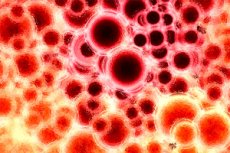New publications
Study shows how cancer cells avoid chemotherapy in low glucose conditions
Last reviewed: 03.07.2025

All iLive content is medically reviewed or fact checked to ensure as much factual accuracy as possible.
We have strict sourcing guidelines and only link to reputable media sites, academic research institutions and, whenever possible, medically peer reviewed studies. Note that the numbers in parentheses ([1], [2], etc.) are clickable links to these studies.
If you feel that any of our content is inaccurate, out-of-date, or otherwise questionable, please select it and press Ctrl + Enter.

A study by researchers at NYU Langone Health and the Perlmutter Cancer Research Center has identified two mechanisms by which cancer cells avoid being killed by chemotherapy in low-glucose conditions. These mechanisms allow the cells to adapt to the hostile environment and minimize the effectiveness of the drugs.
Key findings of the study:
Slowing down the consumption of uridine nucleotides:
- Antimetabolite drugs such as raltitrexed, PALA, and brequinar aim to block the synthesis of pyrimidines, which are essential for the growth and reproduction of cancer cells.
- However, in low glucose conditions, the tumor microenvironment slows the uptake of uridine nucleotides, which reduces the effectiveness of these drugs. Glucose is needed to convert uridine (UTP) to its active form UDP-glucose, which is used by cells.
Inactivation of proteins that initiate apoptosis:
- Low glucose levels prevent the activation of BAX and BAK proteins on the surface of mitochondria, which trigger a cascade of enzymes that cause apoptosis (cell death).
- Without activation of these proteins, mitochondria are preserved, allowing cancer cells to continue to survive.
Significance of the study:
- New chemotherapy strategy: The findings could help develop combination therapies that could "trick" cancer cells into responding to low glucose levels in the same way they would under normal conditions.
- Diagnostic tests: Results can be used to predict how a patient's cancer cells will respond to chemotherapy, helping to personalize treatment.
- Additional avenues to explore: There are plans to investigate blocking other metabolic pathways in cancer cells to make them more sensitive to chemotherapy. Experimental drugs such as Chk-1 and ATR inhibitors already exist but require further study due to their poor tolerability.
Conclusion:
This study explains why chemotherapy may be less effective in low glucose conditions and paves the way for new approaches to cancer treatment.
The study was published in the journal Nature Metabolism.
